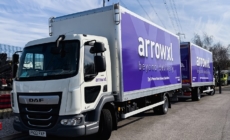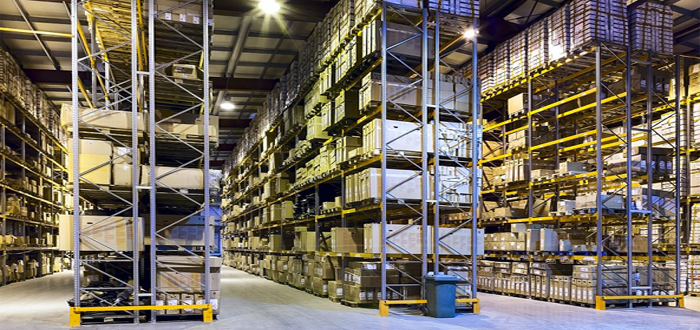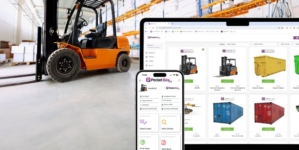-
ROSSLARE EUROPORT TARGETS HEALTH & SAFETY WITH CAMERA TELEMATICS PARTNERSHIP - 2 days ago
-
Landmark Study Reveals Wearable Robotics Significantly Boost Safety and Efficiency in Industrial Environments - July 24, 2024
-
Visku Tackle The Retail Seasonality Challenge One Pallet At A Time - July 22, 2024
-
KAMMAC AND BERGEN LOGISTICS STRENGTHEN FASHION & LIFESTYLE SERVICES IN THE UK - July 19, 2024
-
TENTBOX EXTENDS PARTNERSHIP WITH ARROWXL TO SUPPORT INCREASING DEMAND - July 17, 2024
-
The Perfume Shop improves customer journeys while driving profitability in partnership with Scurri - July 17, 2024
-
ZEROMISSION SECURES £2.3M ($3M) INVESTMENT TO ACCELERATE ELECTRIC FLEETS - July 16, 2024
-
BCMPA CELEBRATES SUCCESS OF 2024 CONFERENCE - July 15, 2024
-
Best of the Best: Jungheinrich Celebrates Triple International Award Win - July 12, 2024
-
GOPLASTICPALLETS.COM CALLS ON NEW CHANCELLOR RACHEL REEVES TO CONSIDER PLASTIC PACKAGING TAX REFORM - July 10, 2024
Plain sailing to successful logistics consultancy.
Go Supply Chain Director, Gavin Parnell, offers advice on how the right consultancy, can help a growing business tackle its warehouse challenges, and make a smooth transition as it steps up to the next level.
Your company is growing? Good times! However, be warned because this can also be one of the riskiest times for a business, particularly smaller operations. Stepping up to the next level to maximise growth requires navigating out of the calm waters of existing activity levels into the wider business ocean.
The safest course is to take advice from a consultant who knows where the currents of risk lie and one that can help a business with the wind in its sails avoid being blown off course.
Handling growth is a key logistics issue with a warehouse at its heart. Any business should periodically conduct a review to examine their warehouse processes to ensure they keep in line with best practice into the future. The review could result in the implementation of one or a mix of solutions including a move to a new warehouse, improved order picking practice, investment in warehouse technology or even outsourcing to a third party operator.
This is where a consultancy can really add value to a logistics operation because determining requirements for warehousing over the next 5-8 years, and to design an appropriate solution, is a critical strategic investment.
It is hard for operators who are focussed intently on their business to see or understand all of the external forces that might potentially impact on their plan, let alone be in touch with the current best practice, trends and technology. These might include Industry 4.0, The Internet of things, automation and robotics, the ecommerce revolution and omnichannel retail, JIT manufacturing, far versus near shoring, efficient order picking, congestion, warehouse space availability, sustainability, Corporate Social Responsibility and, not forgetting of course, Brexit.
The first step is to understand the existing warehouse operation and review the company’s requirements for the future in line with its growth plan.
Visiting an existing site will allow the consultant to assess the project. Then it’s time to crunch data. With complex projects it is important to combine data analysis with a good level of client engagement to ensure requirements are fully understood.
The next step is to design a new solution. This will involve providing CAD layout drawings, capital equipment and operating cost schedules, as well as advice on warehouse process improvement.
When it comes to designing a more efficient layout, whether in a new or existing warehouse, a consultant will be able to deploy their knowledge gained on the project to produce an operational design, which is tailored to the client’s specific requirements while conforming to industry standards. The golden rule is always to take continued growth into account and build for the future.
The consultant should advise the company on the various elements of the process design – it is important to discuss these elements with system providers and to incorporate where possible their advice.
Strategic options around outsourcing and future product lines also need to be discussed to come to an agreed position on the sizing of a new warehouse. This is always a tricky issue for very fast growing companies, such as e-tailers. A ‘strategic roadmap’ should be plotted for the future of the distribution operations as the business continues to grow.
Even the best plans will come to nothing without approval from the top, with a lot of time and effort wasted, not to mention opportunity lost. Because chairperson or board ‘buy-in’ is essential, the plan needs to presented with clarity to help gain their backing.
Once obtained, and the project is underway, the consultant should offer full support until it is completed – and the better will make themselves available for continued support afterwards.
So how do you find a consultant that will deliver maximum value to your logistics project? There are a number of key questions to ask, starting with their implementation experience. Can they walk the walk, not just talk the talk and are they a specialist in your area? Niche consultants will offer value to many projects, particularly those of SMEs.
How well do they listen to you, your key stakeholders and your teams? Listening is essential to ensure that the project is delivered by the business and for the business and not seen purely as an external intervention.
A good consultant should recognise the factors that add risk to projects and work with the client to minimise these, even before they are engaged.
Investigate the consultant’s methodologies. Are they proven and structured to deliver robust, evidence-based recommendations?
Say no to yes people. A consultancy that is afraid to challenge the status quo or to recognise existing good practice when it sees it will not offer value. A trust based client relationship needs to be established, one where the consultant is honest with the client about the value of the project.
Enquire into the consultant’s experience and the breadth of the range of projects, sectors and geographies from which they derive their knowledge. Are they independent from software companies, materials handling vendors and third party logistics operators?
Having the right consultant in place will give a business confidence that its strategic investment in a new warehouse operation is not only right now but will be for years to come. Happy sailing.
































